
Photo credit: Arisa Chattasa, Unsplash
Did you know the people most likely to suffer from imposter syndrome are high-achieving, go-getters? It’s ironic, isn’t it? The people who most deserve to feel good about their accomplishments end up second-guessing their abilities and downplaying their skills. It can be a vicious cycle, tearing the core of someone’s confidence to shreds and creating a self-fulfilling prophecy.
Women seem to fall to this fraudulent feeling more often than men, but a Harvard Business Review article claims that has more to do with existing workplace biases than anything else.
Are You Prone to Imposter Syndrome?
There is a general consensus that certain personality types do lend themselves to suffering from imposter syndrome more than others. Healthline.com outlines the characteristics of each.
- Perfectionist
- Natural Genius
- Rugged Individualist
- Expert
- Superhero
No matter what dominates your personality make-up, it’s important to recognize if you tend to minimize the good and catastrophize the bad when it comes to your personal experiences. We’re not talking about being humble or falling on your sword here either. Imposter syndrome is internal, not external. It lives inside your mind, casting a cloud of doubt over all your bright spots. Psycom has a quiz you can take to see if you’re prone to overwhelming self-doubt despite evidence to the contrary.
Don’t Listen to the Devil
We’ve all seen the image of an angel on one shoulder and the devil on the other. People with imposter syndrome tend to lean toward listening to the devil. In this case, the little red character isn’t telling them to do something bad, it’s telling them they are bad. Bad at what they do. Bad at making decisions. Bad at managing crisis situations. Bad at doing whatever it is they actually do very well!
This leads to incessant worry that they’ll be discovered as a fraud and lose their position. An especially painful twist is that those who feel like an imposter take on all the blame for their mistakes, but none of the glory for their accomplishments.
Fight Fairly – Especially with Yourself
A Forbes.com article gives tips to combat the imposter phenomenon, including talking about it with other professionals in your ranks. There are a lot of other ideas to help you too. Some of our favorites are below.
Stop the negative feedback loop: talk back to yourself, defend your abilities with a passion
Claim your wins – big and small: actually, write them down as they happen and keep them visible as a reminder
Realize your limitations: don’t expect to excel at everything, or be perfect at anything the first time around
Create a Trusted Circle: know the people you can turn to for an honest take on how you’re feeling
Recognize luck versus work: if you can recreate it, it’s not luck, it’s your hard work
Finally, know you’re not alone! According to Psycom, roughly 70% of people in the U.S. experience imposter syndrome at some point in their lives. It may come and go depending on the situation, so having several tools to fight it is important. Find the ways that help you the most and then share them with someone else struggling to accept their awesomeness!


